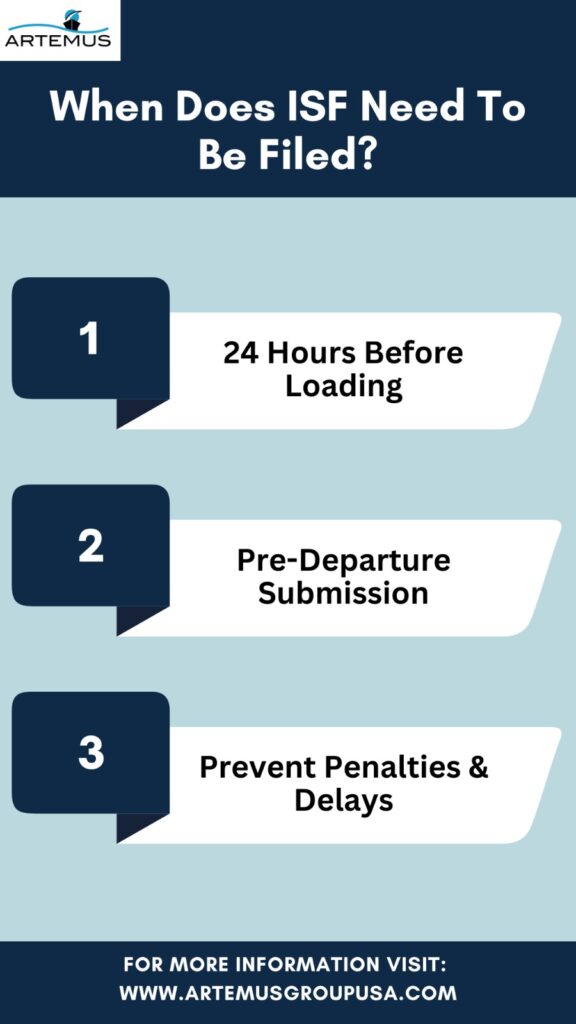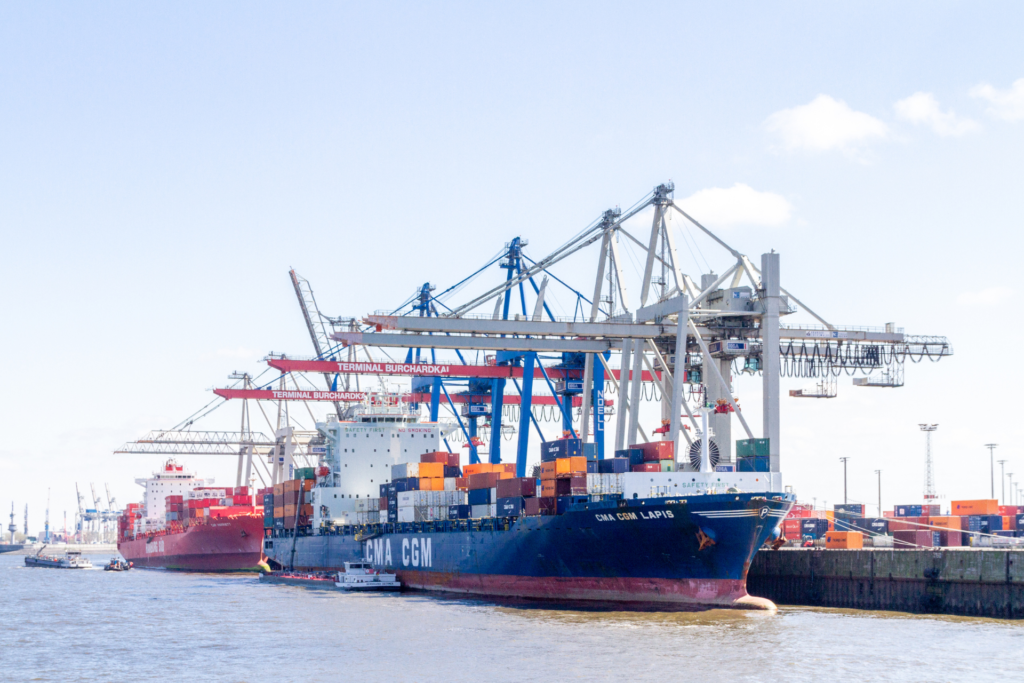
What Is Inbound Logistics & Outbound Logistics? A 2025 Guide
In the dynamic world of supply chain management, understanding the nuances of inbound and outbound logistics is crucial for operational

In the intricate realm of global commerce, adherence to regulations is paramount. One such regulation that holds exceptional importance in international shipping is the Importer Security Filing (ISF), often referred to as “10+2.” If you’ve ever wondered about the pivotal question – “When Does ISF Need To Be Filed?” – you’re not alone. This blog delves into the timely submission of ISF and explores how Artemus, an AI-driven marvel, aids in unraveling the complexities of this imperative requirement.
Artemus offers top-of-the-line ISF compliance web software to streamline the shipping process for businesses of all sizes. Our service is designed to provide comprehensive and reliable support for importers, buyers, freight forwarders, NVOCC, and carriers in complying with the ISF (10+2) regulations set forth by the US Customs and Border Protection (CBP).
Table Of Contents
The Importer Security Filing (ISF), commonly referred to as “10+2,” is a mandatory requirement by the U.S. For shipments arriving by sea into the United States, oversight is provided by the Customs and Border Protection (CBP). Its purpose is to enhance national security by providing CBP with vital information about incoming cargo before it arrives at U.S. ports.
This information includes details about the shipper, consignee, commodity being shipped, and various supply chain components. Carriers are also required to provide vessel-related data. By obtaining this advanced data, CBP can assess potential security risks and streamline the cargo inspection process upon the cargo’s arrival, ensuring both security and efficiency in international trade.
Importers, or their authorized agents, are responsible for submitting the ISF data to CBP at least 24 hours prior to the cargo’s loading onto a vessel in the foreign port. Failure to comply with ISF requirements can lead to penalties and potential delays in cargo release. Thus, accurate and timely ISF filing is vital for importers and their partners in the shipping process to facilitate smooth trade operations while adhering to security protocols.
Related: ISF Filing Process: A Detailed Step-By-Step Guide

The Importer Security Filing (ISF) is overseen by the U.S. Customs and Border Protection (CBP) and necessitates submitting essential shipment details to CBP a minimum of 24 hours before cargo is loaded onto a foreign vessel at the departure port. This proactive practice equips CBP with critical information including shipper and consignee details, nature of goods, and supply chain components.
This pre-departure submission timeline is vital for maintaining smooth trade operations and preventing potential penalties and delays in cargo release upon reaching U.S. ports. Adhering to this advanced filing timeframe is imperative for importers and shipping stakeholders, establishing a cohesive balance between security protocols and efficient international trade.
Related: Who Is Responsible For Filing The ISF? Know The Key Roles
The Importer Security Filing (ISF), often referred to as “10+2,” serves a dual purpose and plays a significant role in customs clearance. Firstly, it streamlines and expedites the customs clearance process by mandating the submission of essential shipment details prior to cargo arrival. These details, encompassing shipper and consignee information, cargo specifics, and supply chain elements, allow customs authorities to assess incoming cargo more efficiently.
Secondly, ISF enhances risk assessment for Customs and Border Protection (CBP) by providing valuable insights into potential security concerns before the cargo reaches U.S. ports. This proactive approach not only strengthens security measures but also contributes to maintaining a smoother and more secure flow of international trade.
Related: What Is ISF Bond? Types, Cost, & Components To Know
The Importer Security Filing (ISF) timeline mandates that essential shipment details be submitted to the U.S. Customs and Border Protection (CBP) no later than 24 hours before the cargo is loaded onto a vessel at the foreign port of departure.
This proactive requirement ensures that CBP has ample time to analyze and assess potential security risks associated with the incoming cargo. Adhering to this ISF filing deadline is crucial for importers and their partners in the shipping process to facilitate a seamless trade operation, avoid penalties, and prevent potential delays in cargo release upon arrival at U.S. ports.
Related:ISF Filing Cost: Elements, Hidden Costs, & Minimization Tips
In the realm of Import Security Filing (ISF), there exist specific scenarios where filing requirements can be waived. These exemptions recognize unique circumstances that do not necessitate the usual ISF compliance. Here are cases where ISF filing might not be required:
Related: 5 Types Of ISF Penalty & Fines To Know To Avoid Losses
Artemus is at the forefront of providing a leading Information Security Framework (ISF) software solution tailored to streamline compliance processes. As a trusted name in the industry, Artemus is dedicated to assisting businesses from various sectors in effectively managing their compliance requirements.
The ISF software solution offered by Artemus is a comprehensive platform designed to simplify complex compliance challenges. This solution is adaptable to diverse compliance frameworks and regulatory standards, making it suitable for industries. Artemus is the go-to choice for businesses seeking a reliable and efficient way to navigate the intricacies of compliance processes.
The responsibility of filing the ISF lies with the importer or their authorized representative in the shipping process.
An ISF must be filed with the U.S. Customs and Border Protection (CBP) at least 24 hours prior to the cargo’s loading onto a vessel at the foreign port of departure.
The purpose of ISF filing is to enhance trade security by providing the U.S. Customs and Border Protection (CBP) with advanced information about incoming cargo, aiding in risk assessment, and streamlining cargo inspections at U.S. ports.

In the realm of international trade, precision and adherence to regulations are paramount. The query regarding the necessary timing for ISF filing holds significant importance in ensuring both security and the seamless flow of operations. With a 24-hour advanced filing requirement, importers not only navigate compliance but also proactively contribute to risk assessment, ultimately fortifying national security while upholding the efficiency of cross-border trade.
Related: ISF Filing Deadline: Timeline, Consequences, & Exceptions

In the dynamic world of supply chain management, understanding the nuances of inbound and outbound logistics is crucial for operational

In today’s interconnected world, businesses rely heavily on global trade to expand their markets, access new resources, and drive growth.

Importing goods for resale in the USA presents a lucrative business opportunity, but navigating the complexities of U.S. customs regulations,
Get In Touch
Artemus’ Software Solutions for ISF, AMS, Japan AFR, eManifest Canada, & Panama B2B filings.